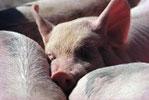 The animal physiology program offers students the opportunity to pursue M.S. and Ph.D. degrees studying the biological processes which are critical for the functioning of all animal species. Research conducted by this graduate faculty explores the basic processes of cells, tissues and organ systems in animals and humans and the application of this knowledge for efficient animal production and the enhanced understanding and treatment of animal and human diseases. Areas of research dealing with animal reproduction include: the neuroendocrine control of reproduction; the pituitary and intragonadal regulation of ovarian and testicular germ cell maturation as well as the analysis of seminal plasma for improved fertility. Research examining cellular and molecular processes in relation to disease include topics such as: the regulation of ion and molecule transport; the mechanisms of aging/cellular senescence; the development of immortal cell models; and the paracrine interactions and cell signaling important in carcinogenesis. Research in the area of functional genomics deals with the development of animals for modeling and treating human disease, particularly diabetes and cystic fibrosis.
The animal physiology program offers students the opportunity to pursue M.S. and Ph.D. degrees studying the biological processes which are critical for the functioning of all animal species. Research conducted by this graduate faculty explores the basic processes of cells, tissues and organ systems in animals and humans and the application of this knowledge for efficient animal production and the enhanced understanding and treatment of animal and human diseases. Areas of research dealing with animal reproduction include: the neuroendocrine control of reproduction; the pituitary and intragonadal regulation of ovarian and testicular germ cell maturation as well as the analysis of seminal plasma for improved fertility. Research examining cellular and molecular processes in relation to disease include topics such as: the regulation of ion and molecule transport; the mechanisms of aging/cellular senescence; the development of immortal cell models; and the paracrine interactions and cell signaling important in carcinogenesis. Research in the area of functional genomics deals with the development of animals for modeling and treating human disease, particularly diabetes and cystic fibrosis.
Students choosing this area of emphasis become a part of an engaging, supportive and collaborative group of researchers with an interdisciplinary approach to graduate education and research. Coursework options encompass many disciplines in addition to physiology including biochemistry, cell biology, molecular biology, neuroscience and veterinary medicine. Experimental approaches employed by these researchers span classical biochemical analyses to state-of-the-art molecular and cellular techniques for the development of cellular and animal models. Interactions with faculty and students from multiple departments and research programs enhance the graduate experience. Students graduating from this program receive excellent training for a variety of future careers including employment as scientists and educators at academic, industry and government institutions as well as further education as veterinary and medical practitioners.
